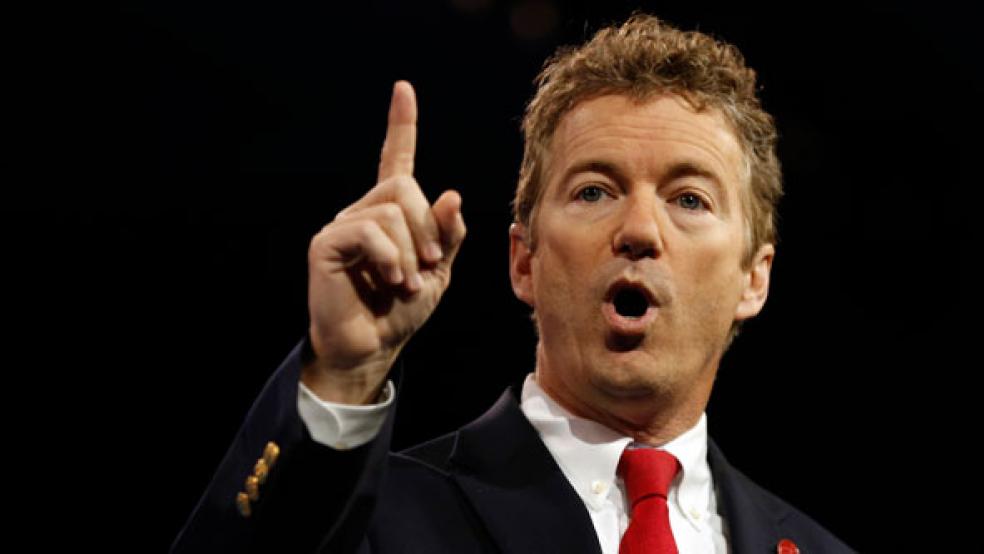Congressional Democrats are planning a blizzard of publicity events and delaying tactics to try to block the Republicans’ drive to repeal the Affordable Care Act in the coming weeks, although few give them much chance of success.
Arguably the Democrats’ longest of long-shots in slowing or sidetracking the Obamacare repeal legislation is the effort of Sen. Rand Paul, the libertarian, free-spirted Republican from Kentucky who unsuccessfully challenged Donald Trump for the GOP presidential nomination.
Paul, 53, is one of at least three Republican senators who have said it might be a colossal mistake for the Republicans to forge ahead with repealing Obamacare without a replacement plan ready in the wings to avert upheaval in the health insurance industry and prevent millions of Americans from losing their coverage.
Related: Obamacare Repeal Could Push Rural Hospitals to the Brink
“We should repeal Obamacare, but partial repeal will only accelerate the current chaos and may eventually lead to calls for a taxpayer bailout of insurance companies,” he wrote recently.
Two other more moderate Republican senators, Susan Collins of Maine and Bill Cassidy of Louisiana, also voiced concern that reckless action now by the GOP could leave millions of Americans in the lurch and trigger political retribution against their party. But Paul was the only Senate Republican to vote on Wednesday against beginning the complex “reconciliation” budget process that will culminate in a final vote to repeal Obamacare.
Then on Thursday, he attempted to up the ante with a morning meeting with nearly two dozen arch conservatives in the House — members of the Freedom Caucus — to discuss possible opposition strategies. Freedom Caucus members are universally opposed to Obamacare and have long called for its repeal. However, many of those members are also ideological purists on the subject of budgets and spending and are opposed to almost anything that raises the spending caps and drives up the now $19.9 trillion national debt.
Related: Obamacare Repeal Is a Fiscal Minefield for the GOP
Paul argued that the fiscal 2017 budget resolution that the leadership just placed on a fast track to passage by a simple majority vote not only would dismantle key sections of Obamacare, but theoretically would permit major tax cuts and spending that could increase the debt by $9.7 trillion over the coming decade.
“I want to make sure that conservatives in the House knew that together we can have some power and impact on what the budget will be, that the budget is a Republican document, there will be no Democrats on board,” Paul told reporters after the meeting. “It should be a conservative document that should not add $9.7 trillion to the debt over 10 years.”
Ross Baker, a political scientist and congressional expert at Rutgers University, said yesterday that it’s hard to imagine that Trump’s proposed combination of tax cuts and $1 trillion dollars in infrastructure spending would please House conservatives. “So I think Paul sees an opportunity to make some converts,” Baker said. “At this point they may just take a wait-and-see attitude and then decide later their feelings about Trump’s spending and taxing plans.
Related: Republicans Are Having Second Thoughts About Scrapping Obamacare Taxes
Although the GOP holds a solid 247-to-188 majority in the House, a defection by 24 members of the Freedom Caucus could derail House Speaker Paul Ryan’s crusade to repeal Obamacare, just as a defection by Paul and two other Senate Republicans could give Senate Majority Leader Mitch McConnell (R-KY) fits in steering repeal through the Senate.
But as The Washington Post reported yesterday after Paul’s meeting with the Freedom Caucus, “Few of the House’s staunch conservatives were ready to pull the trigger.”
Rep. David Schweikert (R-AZ) told reporters that “I just came to understand all the different ideas about where we go next,” but added that he would probably vote for the budget resolution.
Related: GOP and Dem Governors Are Closing Ranks Against Obamacare Repeal
Rep. Mark Meadows (R-NC) said his group hasn’t made a decision whether to support the budget resolution or not. However, he argued that it would be far preferable to simultaneously repeal and replace Obamacare instead of putting off a decision on a new program for months or even years, as many GOP leaders have suggested.
However, after what the Post described as a “collective shrug” from House conservatives this time, Paul may find himself on a lonely quest. During a news conference yesterday, Ryan told reporters he was “really not concerned” about Paul’s intervention in internal House GOP policy-making. He said his members know that a second, fiscal 2018 budget resolution will be introduced next fall that would address concerns about a rising debt.
“This is a repeal resolution,” he said of the pending budget legislation. “Our members fully understand that. We’ve been planning for this for quite some time. The full budget resolution — the traditional budget resolution — will occur this fall, like it always does. And our members understand this process.”
Ryan indicated that the GOP would have a replacement plan in hand before the end of this year. However, he declined to commit when asked if the Republican plan would allow everyone covered through Obamacare to remain insured.
An aide to the Senate Budget Committee agreed with Ryan that the fiscal 2018 budget will be a comprehensive plan “that will put our fiscal house in order.” He added that, the current budget resolution would at least provide $2 billion in savings for deficit reduction. “And we know repeal will generate a lot more savings, according to the Congressional Budget Office,” he added.





